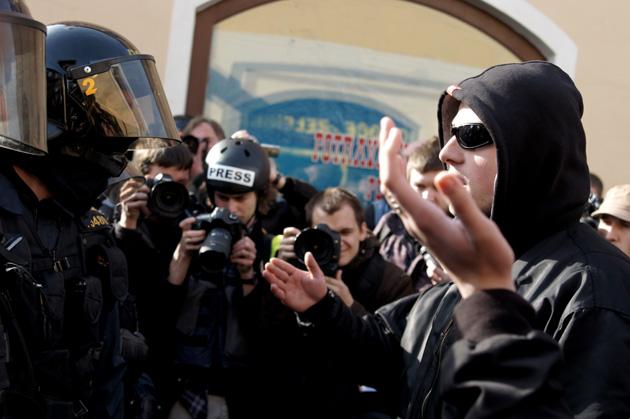Czech Republic's quarterly report on extremism: Ultra-right trend is anti-immigration, ultra-left is unable to unify

The main topics taken up by Czech extremist groups during the first quarter of 2016 were a critique and rejection of the European Union and migration. The Czech Interior Ministry published its "Summary Situation Report on Extremism" on 26 April.
Some political representatives, especially some cabinet members, have become the target of extremist criticism during the past three months. According to the report, it is possible to "see a big security risk in the tendencies to create anti-immigration or anti-Islam militias. The entities advocating for that approach are intentionally inciting the sense that migrants and the Muslim community are a threat. For the time being, however, these are probably just virtual projects."
Right-wing extremists in particular have also criticized the media, primarily the public broadcast media. They have accused public broadcasting of informing the public in ways that are misleading or untrue and have attempted to reduce the credibility of such news sources in the eyes of the public.
In that context, right-wing extremists are now promoting and using alternative media outlets. "Many of these alternative media outlets have intentionally deviated toward publicizing conspiracy theories and obvious disinfomation. These alternative media outlets are marked by their practice of never citing the sources for their information," the report says.
During the first three months of 2016, extremists convened 73 events, 33 of them by left-wing entities, 32 by right-wing entities, and eight by anti-immigration and anti-Islamic groups. A total of 47 felonies with an extremist subtext were detected during that time.
The current mobilization of anti-immigrant forces has targeted primarily older persons dissatisfied with the developments since 1989, a difference compared to previous years, when their ambition was to target young ultras in particular. According to the report, the ultra-right remained fractured by the rivalry between the DSSS and National Democracy (ND) parties.
Both parties, however, have lost support from traditional neo-Nazis, according to the report. National Democracy has developed and last year created various local organizations, moving away from criticizing the EU and toward cricitizing the domestic political representation, the Czech Social Democratic party, and Czech Prime Minister Bohuslav Sobotka, the report found.
Compared to other entities, the ND has excelled when it comes to radical rhetoric. As far as the ultra-left is concerned, the report says that this year such groups "continue to lack a long-term topic".
The ultra-left is said to be grappling with a lack of interest from most of the public in what they believed is required for social change. The report notes that individual leading figures on the "LEX" (left-wing extremist) scene are allegedly incapable of achieving consensus.